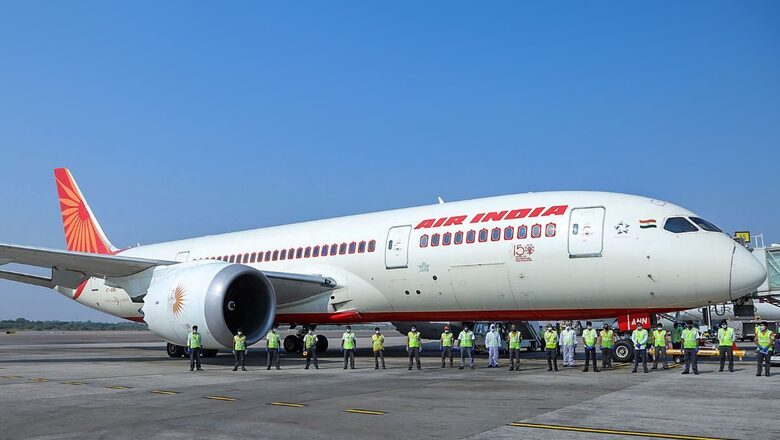
views
Air India is all geared up to revamp its freight and cargo operations with an impressive plan to enhance its cargo-handling capacity.
Wide-body aircraft from aviation giants Airbus and Boeing will soon be delivered to the Tata group airline, providing a huge boost. A whopping 70 wide-body planes, including 34 A350-1000s, six A350-900s, 20 Boeing 787 Dreamliners, and ten Boeing 777Xs, are part of the massive 470-plane order.
Air India aims to increase its annual cargo carrying capacity by a staggering 300 percent, reaching a massive 2 million tonnes within the next five years, according to an official statement released on Wednesday. This significant boost in capacity aligns with the Indian Government’s ambitious plan to grow the air cargo industry to an impressive 10 million tonnes by 2030.
The wide-body aircraft, with their non-stop connectivity to key export markets worldwide, are set to play a pivotal role in expanding Air India’s cargo operations. This strategic move is in line with the Indian government’s push to further develop the air cargo and logistics industry in the country.
Boeing’s commercial market outlook indicates that India’s air cargo growth is projected to experience an average annual increase of 6.3 percent, primarily driven by the manufacturing and e-commerce sectors. In the fiscal year 2022-23, Indian airports handled a total of 3.2 million tonnes of cargo, with domestic cargo registering a remarkable 10 percent year-on-year growth while international freight saw a decline of 5 percent, as per the data from the Airports Authority of India.
Air India is actively working on multiple initiatives across operational and logistics domains to play a significant role in the air cargo segment. Collaborating with its joint venture partner SATS, the airline is dedicated to investing substantial capital expenditure in developing airport and logistics infrastructure. Additionally, Air India is exploring possibilities to enhance freighter capacity through collaborations with other partners.
At present, Air India operates cargo services to over 40 international and 38 domestic destinations. In a bid to further enhance customer service and operational efficiency, the airline is set to launch three 24×7 control centers for seamless integration and improved customer interface.
To expand its reach and strengthen partnerships, Air India is actively focusing on bolstering interline partnerships and trucking network connections. It has already established partnerships with offline trucking points worldwide to expand its base and enhance trans-shipment efficiency and volumes at major airports like Delhi, Mumbai, and Bengaluru.
With the adoption of advanced technologies such as blockchain and artificial intelligence, Air India aims to optimize productivity in cargo operations. The airline has introduced short-term changes to its existing IT cargo system to enhance efficiency, enabling electronic data interchange, seamless connectivity with trade partners, and real-time updates on flight and shipment status.
With these ambitious plans and strategic initiatives, Air India is poised to achieve significant growth in its cargo operations, strengthening its position on the global stage.
Short-term changes are underway in its existing IT cargo system to enhance efficiency in areas such as electronic data interchange, seamless connectivity with trade partners, and real-time updates on flight and shipment status. With these transformative steps, Air India is all set to embark on a thrilling journey towards becoming a dominant force in the global air cargo industry.


















Comments
0 comment